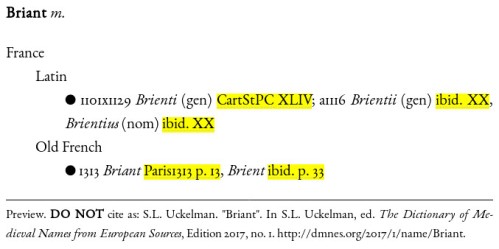Every Monday we will post an entry that hasn’t yet been published with a view towards harnessing the collective onomastic power of the internet. If you have any thoughts about the name’s origin, other variants it might be related to, other examples of its use, etc., please share them in the comments! If you wish to browse other Mystery Monday names, there is an index.
But first! A huge shout-out to our technical guru, Dr. Joel Uckelman, who got the site back up and running again Saturday evening. What should have been a simple server upgrade turned into a whole row of dominoes collapsing; first, it turned out that our original hosting service was not equipped to handle the upgrade, and the first we knew of this was when we tried rebooting the machine and it wouldn’t. We switched providers, he set up an entirely new virtual machine and server, only time find that when he tried to restore all the data via rsync, the connection kept getting dropped after 10-15 seconds, making it completely impossible to rebuild the site. After a couple of rounds with customer service, which regularly got escalated up to the next level, it became clear that (a) it was a network issue on their end, not our end and (b) they weren’t interested in doing the legwork to find out what the issue was and fix it. So, bye-bye hoster 2, on to hoster 3. He set up a new virtual machine Friday night, and thankfully by the end of Saturday we were able to have the entire site restored. If you’ve ever benefited from the DMNES and would like a way to say thanks, feel free to buy him a beer or a coffee if you’re ever in the area. The hard work of the editorial team would be nothing without the technical infrastructure to make the data available to the world.
Today’s Mystery Monday name is from the Redon cartularies, a dithematic Breton name where we’ve identified the prototheme but not the deuterotheme:
Our resources for Breton names are, unfortunately, rather limited; so if an element or name doesn’t appear in what we have, we’re generally pretty much at a loss. If any of you, dear readers, have better Breton resources than we do, we’d love to know what you have to say about this name! Please share in the comments.







